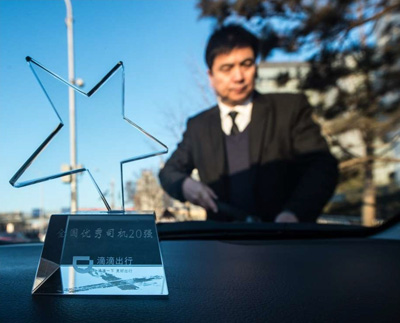Drivers of online car-hailing platforms cannot withdraw cash. Who will protect the rights and interests of these workers?

Zhang Laifu, an order-taking champion of an online car-hailing platform, wipes the vehicle between waiting for customers. Xinhua News Agency reporter, photo by Luo Xiaoguang
Recently, the news that drivers of a certain online ride-hailing platform cannot withdraw cash has been hyped up, and the discussion on who will protect the labor rights and interests of online ride-hailing drivers has also become heated.
The sharing economy is surging, and the "threshold" for providing labor services has been lowered to the extent that everyone can participate. How to protect the rights and interests of workers under this "flexible employment" has reached a level that cannot be ignored.
What is the relationship between Internet platforms and workers? There is still much debate
Mr. Yu, a Beijing-based taxi driver, has been taking orders through a well-known online ride-hailing platform for the past two years. Talking about why he wanted to work as a taxi driver, Mr. Yu said that he was in his 40s and could not find a good job in his hometown in Hebei. He felt that the income from driving a car was not bad, so he went to Beijing to work. "The situation like mine is very common among the car drivers I know."
Master Yu told reporters that when he first arrived, he was employed by a certain online car-hailing platform. After signing an employment contract, his monthly salary was about five or six thousand yuan, and the company paid five insurances and one housing fund for him.
"But after all, it’s still someone else’s car," so Master Yu gritted his teeth and took out a loan to buy a private car worth more than 200,000 yuan. Master Yu said that now as a full-time car driver, "after deducting various operating costs, the monthly net income is about 7,000 to 8,000 yuan."
But Master Yu also has troubles. After the labor relationship with the last online car-hailing company was terminated, the new platform was not responsible for paying five insurances and one gold for it, and Master Yu was not willing to spend the money himself. "Now I don’t pay social security anymore."
Drivers like Mr. Yu are facing problems with their way out when Beijing’s online car-hailing platform begins to implement the "Beijing Citizenship and Beijing License" policy on May 1. Since there is no labor relationship with the online car-hailing platform, he has not yet figured out what to do next. "The platform has to take about 20% of the fee for each order." Mr. Yu said that discounts and subsidies for drivers have also been cut a lot in the past two years. "It is unreasonable that the platform is only responsible for taking a percentage, but it does not have any obligations to the special car."
Online car-hailing has worn the halo of "sharing economy" since its inception. However, for such a brand-new thing as "sharing economy", the current laws and regulations have not clearly stipulated the relationship between Internet platforms and workers, and there is still a lot of debate among academics and the public.
At present, the most important basis for the management of online car-hailing is the "Interim Measures for the Management of Online Booking Taxi Business Services" (hereinafter referred to as the "Interim Measures") implemented on November 1, 2016, which stipulates: "Online car-hailing platform companies… In accordance with relevant laws and regulations, according to the characteristics of working hours and service frequency, sign various forms of employment contracts or agreements with drivers to clarify the rights and obligations of both parties."
The regulation does not explicitly define the labor relationship between the two parties, but rather gives an open-ended option to "enter into various forms of employment contracts or agreements."
In this regard, Liu Xiaoming, Vice Minister of Transport, said at the press conference of the State Information Office last year that in the process of soliciting opinions on the "Interim Measures", the relevant content of the original exposure draft clearly requires the signing of employment contracts has been revised, and according to the special circumstances such as part-time in the online car-hailing, the current regulations have adopted more flexible employment methods.
"At present, there is no conclusive and consistent international opinion on online car-hailing," Mr. Liu said. "Even in the US, where online car-hailing originated, different states have implemented different management strategies, and their positioning, labor relations, price management and other aspects are still in the process of exploration."
The standards for judging labor relations should be further observed and no haste should be drawn
In fact, shortly after the "Interim Provisions" were issued, the Beijing Haidian Court heard the first online car-hailing traffic case in China. In this case, when a car-hailing car picked up a single passenger, it caused damages due to a traffic accident between the passenger opening the door and others. The Haidian Court held in the first instance that the driver of the online car-hailing car was assigned by the platform to perform the passenger contract between the platform and the passenger. The driver belongs to the party providing labor services, so the platform should bear the corresponding tort liability as the party accepting the driver’s labor services. Experts said that identifying the platform company as the carrier and the order assigned by the platform as the passenger contract between the platform company and the passenger actually implied that the court affirmed that there was a certain labor relationship between the online car-hailing driver and the platform company.
In traditional labour law theory, the determination of whether there is a labour relationship is mainly based on the theory of subordination, that is, whether it has organizational subordination, management subordination and economic subordination. Today, the basis for determining labour relations is mainly the "Notice on Matters Related to the Establishment of Labour Relations" issued in 2005. "But in the past two years, various new business models have emerged one after another, and relying solely on the" Notice "can no longer meet the practical needs." Professor Jiang Ying, dean of the law school of the China Institute of Labour Relations, said.
Jiang Ying analysis, the current network about the car is mainly divided into two categories: one is the B2C model, the platform company and the network about the car driver signed a formal employment contract, making it a regular employee of the company; the other is the C2C model, the network about the car driver has considerable autonomy, not fully affiliated with the company, so in defining its labor relations, the "Interim Provisions" adopted a cautious attitude.
Jiang Ying mentioned that in the US judicial and legal precedent, the judgment standard of labor relations mainly depends on the actual degree of control of the platform company for the driver. Through setting a number of standards for comprehensive judgment, if the degree of control is strong, it is determined that there is a labor relationship. "As for how to judge labor relations under the new sharing economy model, we should further observe and do not rush to conclusions," Jiang Ying said.
It is recommended that relevant departments introduce policies as soon as possible to provide stable expectations for relevant industries and enterprises
"However, the public needs to clarify a misunderstanding in understanding, that is, only the existence of labor relations can protect the legitimate rights and interests of employees." Jiang Ying said that it is not to protect the rights and interests of employees that they must be included in labor relations to protect them.
Jiang Ying said that first of all, the rights and interests of online car-hailing drivers can be protected through the relevant provisions of the employment relationship in the civil law. Second, the "Interim Regulations" allow online car-hailing drivers to sign various forms of employment contracts or agreements with platform companies, and workers can stipulate corresponding rights and obligations in the employment agreement. "Of course, the power of individuals is relatively weak, so on the one hand, government supervision and guidance are very important, and on the other hand, we must also rely on the power of market regulation." Jiang Ying believes that in order to retain a stable and excellent driver group in the market competition, enterprises need to offer more favorable conditions, which is the bargaining chip that the market may provide for negotiations.
"Enterprises excluded employment from the scope of labor law norms, and it did not start with the sharing economy." Wang Xiangqian, a lawyer at Shuangli Law Firm in Beijing and a director of the China Labor Law Research Association, believes that whether to incorporate this new form of employment into the field of labor law is a public policy choice that can only be made after weighing the pros and cons. Wang Xiangqian said that the main body of this game includes workers, enterprises, society and the state, and needs to balance the potentially conflicting values such as labor rights and interests, employment factors, economic vitality, social costs and so on, and make choices.
"It is recommended that the relevant departments investigate as soon as possible and come up with corresponding policies." Wang Xiangqian said that if this form of employment is already widespread in various industries and fields, it will hurt the bones if you want to regulate it. "By giving relevant industries and enterprises expectations as soon as possible, they can avoid the policy and legal risks in development, which is not only conducive to the development of enterprises, but also conducive to the protection of workers’ rights, and social responsibility can also be fully guaranteed." (Reporter, Zhang Cheng)

























































